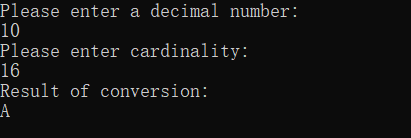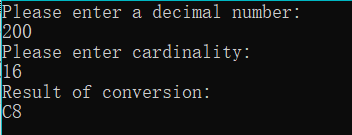Conversion函数思路:
- 传入参数:要转换的数n(非负),要转换成的基数base
- 方法:根据除基取余的转换方式,将余数压入栈中,然后余数出栈,同时根据ascii编码转换为字符输出
代码:
#include<iostream>
using namespace std;
const int maxsize=100;
//顺序栈的类型定义
typedef int datatype;
typedef struct{
datatype data[maxsize];
int Top;
}SeqStack;
//函数原型的声明
void InitStack(SeqStack*& S); //栈的初始化函数
int Empty(SeqStack* S); //判断空栈函数
int Push(SeqStack* S,datatype e); //入栈函数
int Pop(SeqStack* S,datatype& e); //出栈函数
void Conversion(int,int);
//主函数
int main(){
int p,q;
cout<<"Please enter a decimal number:"<<endl;
cin>>p;
cout<<"Please enter cardinality:"<<endl;
cin>>q;
cout<<"Result of conversion:"<<endl;
Conversion(p,q);
return 0;
}
//函数的定义
void InitStack(SeqStack*& S)
{
S=(SeqStack*)malloc(sizeof(SeqStack));
S->Top=0;
}
int Push(SeqStack* S,datatype e){
if(S->Top>=maxsize-1){
cout<<"栈上溢!"<<endl;
return 0;
}
else{
S->data[++S->Top]=e;
return 1;
}
}
int Pop(SeqStack* S,datatype& e){
if(Empty(S)){
cout<<"栈下溢!"<<endl;
return 0;
}
else{
e=S->data[S->Top--];
return 1;
}
}
int Empty(SeqStack* S)
{
if(S->Top<=0)return 1;
else
return 0;
}
void Conversion(int n,int base){
datatype e;
SeqStack* S;
InitStack(S);
while(n!=0){
Push(S,n%base);
n=n/base;
}
while(!Empty(S)){
Pop(S,e);
if(e>9)printf("%c",e+55); //超过9进制,余数会大于9时,字符映射到大写字母
else printf("%c",e+48); //未超过9进制,余数不大于9时,映射到1-9
}
cout<<endl;
}
示例:10转换为16进制的A
200转换为16进制的C8

